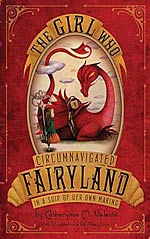
![]() Rhondak101
Rhondak101
10/19/2014
![]()
Memory is a strange thing. I read Catherynne Valente's Palimpsest a couple of years ago. I remember thinking that the book sacrificed plot and substance in order to create lush, beautifully constructed sentences. There's no there there, I thought. Later I found free versions of a couple of her earlier works on her publisher's website and could not get past the first couple of pages (again, orate writing with no substance.) However, Valente is nothing if not prolific and the synopses of her books always sound so interesting I decided I had to give her another try. I decided to start The Girl Who series, but before I did so, I noticed on my WWE page that I had ranked Palimpsest as a 4/5 (!). Has that book gotten progressively worse in my memory as time has passed? Was I being generous? I'll never know because I'm not going to re-read it to see. However, this 4 ranking gave me more hope that I would like The Girl Who Circumnavigated Fairyland in a Ship of Her Own Making.
And I did. I really did. In fact, I can describe much of it as Gaiman-esque, which is perhaps the highest comparison I can ever offer. The book has that wry sensibility of Gaiman's YA books that works for both adults and younger readers. I found myself marking lots of passages that are written for a well-read (and somewhat knowledgeable) audience. For example, when the Green Wind tries to bring the girl September into Fairyland without any papers. He whispers to the customs agent: "You know very well, Betsy, that the Ravished need no papers. It's in the manual, page 764, paragraph six.... The Persephone clause" (Chapter 2). The witch Goodbye tells September that "the future is a kind of stew, a soup, a vichyssoise of the present and the past" and that "magic is not a linear thinker" (Chapter 3). When Saturday and Ell argue about the correct name of a constellation, Calpurnia shrugs this off, saying "regional folkloric differences" (Chapter 10). When September meets Death, he tells her that most people "force me to play chess with them. I don't even like chess! (Chapter 12).
September is in intelligent heroine who has learned about Fairyland from books and stories. Therefore, the book is full of references to other tales, which sometimes match the rules of this Fairyland but many times do not. Her story is a quest myth, following all the beats of Joseph Campbell's monomyth, but done in a smart, fun way. I will finish this series and try, once again, to enjoy her adult works.